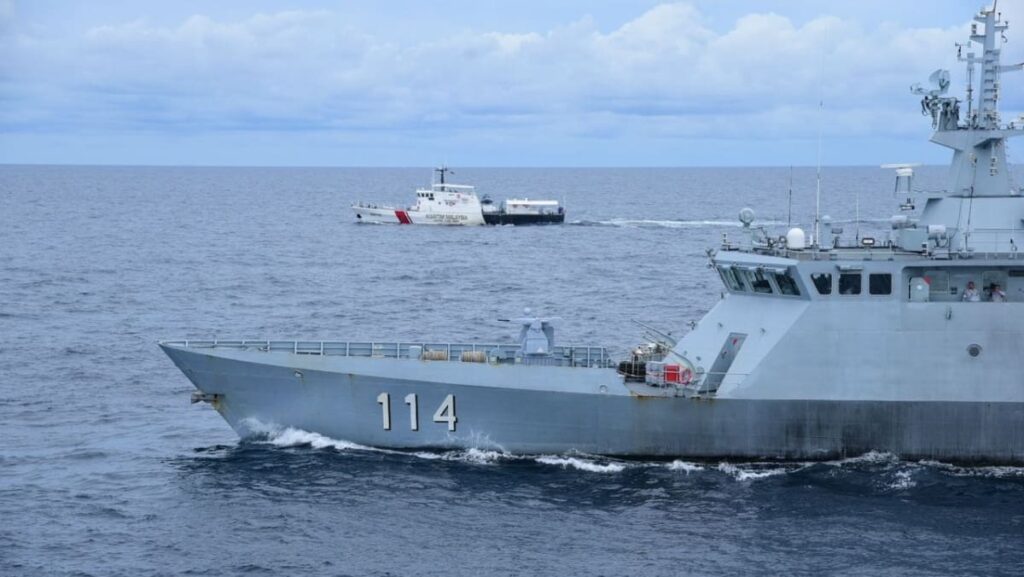With Sabah and Sarawak having thousands of kilometres of coastline, a lack of naval bases will lead to poor accessibility and response times during a crisis, exposing Malaysia to external threats, an expert warned.
Dr Tharishini Krishnan, a senior lecturer at Universiti Pertahanan Nasional Malaysia, wrote in a 2021 commentary published by the New Straits Times that setting up a base in Sarawak will “reduce the overstretched logistical support” from Sabah in overseeing these areas.
“Moreover, the physical existence of MAWILLA 4 will deny China’s effort to persistently seek to alter the status quo there,” she said, using the abbreviated name for the Bintulu naval base.
With that said, Dr Koh highlighted that both the Malaysian navy and coast guard are ill-equipped for EEZ patrols, which require ships that can spend large periods of time out at sea.
The Malaysian navy’s fleet is ageing with hardware that needs replacing, while the coast guard mainly operates vessels more suitable for coastal patrols instead of the open waters of the EEZ, he said.
And while the Sarawak naval base will be home to Malaysia’s new littoral mission ships that are currently being built and will be more suited for EEZ missions, Dr Koh said it will take another three to four years before they are fully operational.
“The new Bintulu base notwithstanding, what is more crucial are the physical assets available that Malaysia can tap to safeguard its South China Sea interests, and that will have to be more offshore-capable ships supported by other maritime domain awareness tools,” he said.
Depending on asset availability, Malaysia could deploy at least one ship to the EEZ at any one time to show it will not give in to “Beijing’s illegitimate claims”, Dr Koh added.
Dr Ian Storey, a maritime security expert at the ISEAS – Yusof Ishak Institute, told CNA that the new base will strengthen Malaysia’s “dual-track policy” on the South China Sea dispute.
It will help the navy “maintain a constant presence” in the oil and gas fields off Sarawak while Malaysia downplays tensions with China to preserve their economic ties, he said.
“The new base won’t have a negative impact on bilateral relations as both the navy and coast guard will maintain a non-confrontational approach towards Chinese vessels in Malaysia’s EEZ,” he predicted.
Royal Malaysian Navy chief Admiral Zulhelmy Ithnain told reporters on Oct 2 that the navy maintains a presence in contested areas but will “avoid aggressive actions”.
“Our primary strategy is to defuse situations through diplomacy. Military assets are only used if diplomacy fails, which we do not believe will happen,” he was reported by the Daily Express as saying at a submarine conference.
DIFFERENT SHADES OF DIPLOMACY
While Malaysia Prime Minister Anwar Ibrahim has said he is willing to discuss the territorial dispute with China, attracting criticism for seemingly being too lenient, Dr Storey believes it is just another attempt at defusing the situation rather than any genuine offer of concession.
It is worth noting that Mr Anwar has insisted that Malaysia’s exploration and drilling activities in the EEZ will continue despite China’s objections, a point confirmed by the AMTI report.
“Despite the Chinese coast guard’s efforts, Malaysia has not only continued its existing oil and gas production but also expanded exploratory activity,” it said, noting that 15 new exploratory wells were drilled off Sarawak in 2024.
Dr Azmi Hassan, a foreign policy analyst and fellow at the National Council of Professors, said Malaysia’s move to continue its oil and gas activities there was “correct”.
“The most that China has done is just shadowing these projects, and so far nothing much has happened, because diplomacy is our way,” he told CNA.
“I think the way to resolve the issue is to talk (with China) about our EEZ, which is based on maritime law. When it is based on maritime law, China will always be on the losing side, because they have no justification in saying that Malaysia’s EEZ is theirs.”
On the other hand, Dr Azmi disagreed with comments coming out of Sarawak that called for a more tangible response to the dispute, saying that Malaysia will end up on the “losing side” in any kind of physical confrontation with China.
“We shouldn’t be upping the ante to face China using our navy … We don’t want to fall into the trap that Manila is currently in. Even though the United States is behind the Philippines, physical altercation will not resolve the issue,” he said.
https://www.channelnewsasia.com/asia/malaysia-south-china-sea-naval-base-sarawak-eez-luconia-4658451


